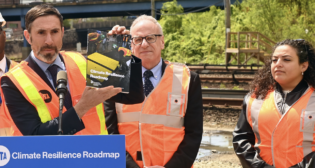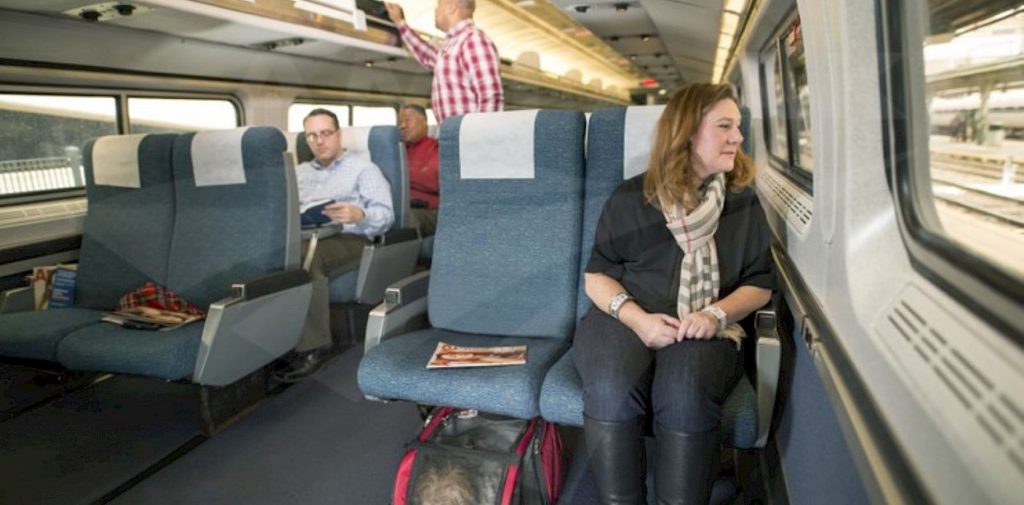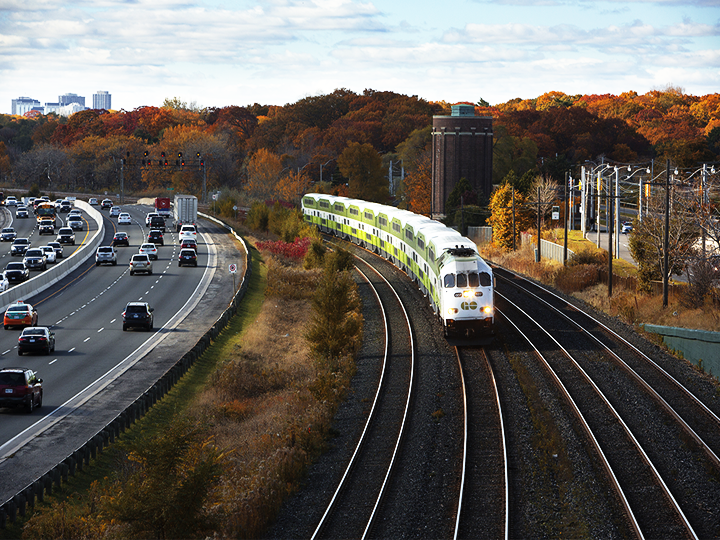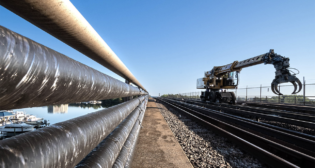
Transit Briefs: APTA, Amtrak F+B Working Group, Arup, Metrolinx, NJ Transit/UITP/Rutgers CAIT
Written by Carolina Worrell, Senior Editor
The new Bramalea GO Station building opened in 2021. (Metrolinx photo)
The American Public Transportation Association (APTA) “strongly urges” public transit agencies to obligate remaining COVID-19 funds as soon as possible. Also, the Amtrak Food & Beverage Working Group sends recommendations to Congress after year-long analysis of Amtrak onboard service; Arup supports Metrolinx plans to electrify Canada’s largest commuter rail network; construction is now complete at Metrolinx’s Bramalea GO Station; and registration is now open for first courses at the International Association of Public Transport’s (UITP) North American Regional Training Center hosted by NJ Transit and Rutgers Center for Advanced Infrastructure and Transportation (CAIT).
APTA
As congressional leaders and the White House continue to negotiate a bill to increase the Debt Limit, APTA announced May 15 that it is “strongly urging” public transit agencies and states to obligate all remaining COVID-19 relief as soon as possible.
According to APTA, without an increase to the Debt Limit, the Department of the Treasury and the Congressional Budget Office estimate that the U.S. will “default and be unable to pay all outstanding government obligations in early June.”
As part of the Debt Limit negotiations, APTA says leaders are considering rescinding all remaining COVID-19 funding, including any public transit COVID-19 unobligated balances. According to the Federal Transit Administration (FTA), as of May 9, 2023, public transit agencies have $2.46 billion of remaining unobligated balances of COVID-19 relief.
Amtrak F+B Working Group
The Rail Passengers Association on May 12 announced that, following a year of study, the Amtrak Food & Beverage Working Group, which was created by Congress and includes a team of passenger advocates, onboard Amtrak employees, state partners and Amtrak management, as part of the Bipartisan Infrastructure Law signed by President Biden in November of 2021, has included nearly two dozen recommendations in its report to Congress— “ranging from simple steps like clear ingredients lists and new efforts around waste control to comprehensive technology improvements such as using satellite-based internet connectivity to keep food items appropriately stocked and allow on-board purchases.”

The report was filed with the Senate Committee on Commerce, Science and Transportation and the Committee on Transportation and Infrastructure in the House of Representatives this month by the Working Group, which completed its research and analysis of Amtrak F&B services in early May.
Included in the recommendations, according to the Working Group, were “short-term improvements, the establishment of follow-up committees to provide transparency and accountability, and requests made by both passengers and onboard employees addressing the different needs of different service models across the country.”
Rail Passengers Association’s Communications Manager M. Ned Butler, an Escoffier-trained chef, spearheaded this project for the Association after working with President & CEO Jim Mathews to draft language included in the Investment Infrastructure and Jobs Act (IIJA) requiring formation of the Working Group to improve Amtrak’s food and beverage offerings.
“This is a truly intentional report. We want to empower the team at Amtrak to make smart choices that lead to more frequent ridership and better experiences on-board,” said Butler. “After our advocates worked diligently to remove the amendment to service dictating F&B must be profitable, we’ve opened up the potential to make meals an amenity that people will once again look forward to as they hop onboard.”
Amtrak has 180 days to provide their response to Congress and come up with a plan to enact these recommendations. From handling immediate needs in the current environment to establishing industry best practices and looking to future tech solutions, this robust report “makes a clear case for how Amtrak can improve over the next five years,” according to the Rail Passengers Association.
Arup
Arup announced May 15 that it has been selected as the Technical Advisor on Metrolinx’s On Corridor Works (OnCorr) project to transform the rail network and introduce new electric trains along core segments of the network in the Greater Toronto and Hamilton area (GTHA), as GO Transit moves to add two-way, all-day GO train service to fast-growing cities and towns outside the Toronto core.

According to Arup, the project will “significantly expand service for commuters in the GTHA by adding regular service outside of peak travel hours, moving from 3,500 weekly trips to more than 10,000 as it electrifies a large portion of the GO Network.” The multi-phase project, delivered under a Progressive Design-Build-Operate-Maintain procurement model, is now in a two-year development phase.
The Arup-led team, which includes subconsultants AECOM, Egis, and Network Rail, says it “supports Metrolinx’s Technical Management Office as they map out the transformation of one of North America’s largest commuter rail systems.”
The OnCorr project, Arup says, is the largest capital infrastructure project in the GO Expansion program. OnCorr includes all works to facilitate a significant expansion of train service, including train infrastructure, train fleet, civil works, signaling, electrification, network control, communication systems, and fleet procurement, as well as the operations and maintenance of the GO Transit rail network. One of the first stages of the project will involve the reconfiguration of tracks and platforms at Union Station, as trains continue to run.
“Arup’s passenger rail experience expertise on more than 35 rail systems in Europe, Australia, New Zealand and Asia will be especially relevant to guide this project,” said Peter Guest, Arup’s Americas Rail Business Leader.
Metrolinx
Metrolinx announced May 15 that construction work at Bramalea GO Station is now complete.
After multiple phases of construction, one of the busiest stations on the Kitchner GO Line now features several new amenities, including a brand-new station building, which the agency says means “improved access and upgraded options that will benefit GO customers today and into the future.”
The new station building, and 2,059-space parking garage opened in 2021, and since then, Metrolinx says more work has been done on the rest of the station area to “make it easier to access, more convenient for customers, and a key community transit hub.”
Since 2021, the station has seen numerous changes, including:
- The opening of the new bus loop, with platforms for GO Transit, Brampton Transit, and Züm Transit.
- New surface parking lots.
- New passenger pick-up and drop off zone.
- An enhanced signalized intersection at Steeles Avenue, which includes separate lanes for buses and cars.
- A brand-new platform and a renovated platform, both with completed tunnels and elevators.
- Covered bicycle parking.
- Enhanced safety features, including a new emergency call system, improved lighting, and more than 100 new security cameras.
NJ Transit/UITP/Rutgers CAIT
NJ Transit announced May 15 that registration is now open for the first ever courses to be held at the International Association of Public Transport’s (UITP) newly created North American Regional Training Center (RTC), supported by a partnership with the agency and Rutgers CAIT.

According to NJ Transit, the training courses “assemble public transportation professionals from across North America and internationally to hear and share best practices and learn new strategies and tactics on topics ranging from electric buses to fare management, rail operations and public transportation fundamentals.” Courses will be offered in July, September, October and November of this year at Rutgers CAIT in Piscataway, N.J.
The four training programs for 2023 are:
- Public Transport Fundamentals for North America – July 10-12, 2023. Click HERE to register.
- Electric Buses: Fleet & Infrastructure Planning, Operations and Maintenance for North America – September 27-29, 2023. Click HERE to register.
- Rail Operations and Maintenance for North America – October 2-4, 2023. Click HERE to register.
- Ticketing and Fare Management for North America – November 6-8, 2023. Click HERE to register.
In March of this year, the three organizations announced their partnership to establish UITP’s first RTC in North America on the campus of Rutgers University.
The RTCs, NJ Transit says, “offer first-class transportation training through the establishment of uniform standards and best practices for all areas of sustainable transportation.” Additionally, the training sessions will provide a worldwide network of data and catalogs of programs driving innovation within rail, bus and much more.
NJ Transit will lead the regional partnership by committing to sponsoring four training programs annually, providing guest speakers for programs when possible, and leveraging its experience as a leader in the delivery of public transportation throughout the area.
Rutgers CAIT will act as a key partner in this endeavor by coordinating with UITP and NJ Transit to provide necessary logistics and administrative support. They will also assist in the marketing of training courses, and by hosting the training sessions.
“This is an exciting time for everyone involved in public transportation, not only in New Jersey, but across our country,” said New Jersey Department of Transportation (NJDOT) Commissioner and NJ Transit Board Chair Diane Gutierrez-Scaccetti. “The training sessions will bring together some of the leading worldwide voices across all facets of our industry. NJ Transit is proud to be a partner in this landmark program.”
“NJ Transit marks the beginning of a new era in public transit training in the U.S., with the opening of registration for four new courses this year,” said NJ Transit President & CEO Kevin S. Corbett. “We’re proud to partner with UITP and Rutgers CAIT to establish UITP’s first Regional Training Center in North America, providing a unique opportunity to access the expertise and insights of UITP’s network of trainers from the top transit agencies around the world.”
“UITP is delighted to open registration to all our 2023 North American training, together with our partners NJ Transir and Rutgers CAIT,” said UITP Secretary General Mohamed Mezghani. “This range of training has been developed to bring comprehensive topics and insights to a wide audience of professionals working in, or interested in, the public transit sector. All program information and registrations are easily accessible on the UITP website, with all courses open to participants across the globe.”
“Rutgers CAIT is excited to welcome the inaugural cohort of transit professionals to campus this summer as part of the UITP North American Regional Training Center,” said CAIT Director Dr. Ali Maher. “From the fundamentals of public transport to managing and maintaining fleets of electric buses, these courses will connect practitioners in North America to an international network of data, best practices, and expertise. Education is a critical first step in building a sustainable transportation system and developing a skilled workforce to address the pressing climate, economic and equity challenges of the 21st century.”
More information on this initiative, including links to the scheduled programs, is available here.



